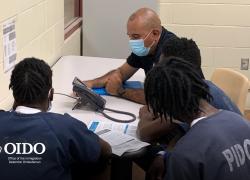Extraordinary Nurse Educators Leading in Extraordinary Times
(NewsUSA) - Nurse educators are in a unique position to make an impact by inspiring nurses in education and by promoting public health through work in schools, businesses, hospitals, and community agencies.
- Nurse educators are in a unique position to make an impact by inspiring nurses in education and by promoting public health through work in schools, businesses, hospitals, and community agencies.
The need for qualified nurses is ongoing, as is the need for nurse educators to prepare them, according to the National League for Nursing.
Many nurses choose to become nurse educators to support the work of nurses who provide everything from routine primary care to lifesaving emergency services to end-of-life comfort.
Encouraging more nurses to consider pursuing careers in nurse education is the best way to ensure a consistent flow of qualified nurses into the healthcare system, and the National League for Nursing provides resources to help them get started. Many nursing education programs are now available through online platforms, which expand the options for nurses who want to pursue careers as nurse educators.
Nurses can earn their master’s degree in nursing or nursing education entirely online, which helps prevent loss of income from taking time off to attend classes and reduces the need for student loans or traveling to classes at a distant location. Nurses can then become Certified Nurse Educators, the badge of expertise in this advanced specialty area of practice.
Prospective nurse educators have two choices of advanced degrees: the Doctor of Nursing Practice (DNP) or the Ph.D. in nursing.
Although one may consider the Ph.D. the primary pathway to becoming a nurse educator, the DNP is also a viable option for some prospective nurse educators because of its focus on clinical practice rather than academic research. We need both pathways in nursing education.
Other reasons nurses choose to become nurse educators include the intellectual stimulation of knowing the latest research in the field, greater autonomy and flexible schedules, and the sense of purpose and generativity that comes with mentoring and advancing the next generation of nurses.
In addition, this year’s NLN Education Summit in September near Washington, DC, celebrates the National League for Nursing’s 130 years as the voice of nursing education. This event will focus on the extraordinary leadership of nurse educators and explores innovations in learning, practice, policy and research “that celebrate the whole person and value new perspectives.” The Summit also offers opportunities to discuss the challenging issues of mental health and health inequity as they relate to nurses, nurse educators, and the health care system.
For more information, visit nln.org












